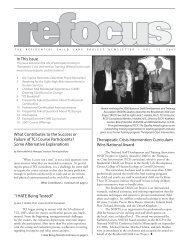The Therapeutic Crisis Intervention System - Residential Child Care ...
The Therapeutic Crisis Intervention System - Residential Child Care ...
The Therapeutic Crisis Intervention System - Residential Child Care ...
You also want an ePaper? Increase the reach of your titles
YUMPU automatically turns print PDFs into web optimized ePapers that Google loves.
Ginott, H. (1969). Between parent and child. New York:<br />
Avon.<br />
Ginott, H. (1972). Between teacher and child. New York:<br />
MacMillan.<br />
Glisson, C., Dukes, D., & Green, P. (2006). <strong>The</strong><br />
effects of the ARC organizational intervention on<br />
caseworker turnover, climate, and culture in children’s<br />
service systems. <strong>Child</strong> Abuse & Neglect, 30, 855-880.<br />
Goldstein, A. P., Sprafkin, R.P., Gershaw, N. J.,<br />
& Klein, P. (1980). Skill-streaming the adolescent.<br />
Champaign, Ill: Research Press Company.<br />
Goleman, D. (1998). Working with emotional<br />
intelligence. New York: Bantam.<br />
Gordon, T. (1975). Parent Effectiveness Training. New<br />
York: New American Library.<br />
Greene, R. W. (2001). <strong>The</strong> explosive child. New York:<br />
Harper Collins Publishers, Inc.<br />
Greene, R. W., & Ablon, J. S. (2006). Treating explosive<br />
kids. New York: <strong>The</strong> Guildford Press.<br />
Hall, E. (1966). <strong>The</strong> hidden dimension. New York:<br />
Doubleday.<br />
Hardy, K., & Laszloffy, T. (2005). Teens who hurt. New<br />
York: Guilford Press.<br />
Harris, J., Allen, D., Cornick, M., Jefferson, A.,<br />
& Mills, R. (1996). Physical interventions: A policy<br />
framework. UK: bild Publications.<br />
Harris, J. (1996). Physical restraint procedures for<br />
managing challenging behaviours presented by<br />
mentally retarded adults and children. Research in<br />
Developmental Disabilities, 17(2), 99-134.<br />
Hartsell, J. (2008). Sisyphus and the itsy-bitsy spider:<br />
Working with children. Dryden, NY: Ithaca Press.<br />
Hastings, R. P. (1996). Staff strategies and explanations<br />
for intervening with challenging behaviours. Journal<br />
of Intellectual Disability Research, 40(2), 166-175.<br />
Heilbrun, K. (1995). Physical control of patients on<br />
an inpatient setting: Forensic vs. civil populations.<br />
Psychiatric Quarterly, 66(2), 133-145.<br />
Bibliography<br />
Hellerstein, D. J., Staub, A. B., & Lequesne, E. (2007).<br />
Decreasing the use of restraint and seclusion among<br />
psychiatric inpatients. Journal of Psychiatric Practice,<br />
13(5), 308-317.<br />
Hobbs, F. D. R. (1994). Aggression towards general<br />
practitioners. In T. Whykes (Ed.), Violence and Health<br />
<strong>Care</strong> Professionals. London: HMSO.<br />
Holden, J.C. (2009). Developing competent crisis<br />
intervention trainers: Assessing the disparity of participant’s<br />
curriculum knowledge/skills and training skills in a crisis<br />
intervention train-the-trainer program. Koln, Germany:<br />
Lamber Academic Publishing.<br />
Holden, J. C., Johnson, T. D., Nunno, M. A., &<br />
Leidy, B. (2007). Using a prone/supine perception<br />
and literature review to forward the conversation<br />
regarding all restraints. In M.J. Holden (Ed.),<br />
<strong>The</strong>rapeutic <strong>Crisis</strong> <strong>Intervention</strong> Update: Safety<br />
<strong>Intervention</strong>s. Ithaca, NY: Family Life Development<br />
Center, Cornell University.<br />
Holden, J. C. & Holden, M. J. (2000). <strong>The</strong> working<br />
system. Training and Development in Human Services:<br />
<strong>The</strong> Journal of the National Staff Development and<br />
Training Association, 1, 34-38.<br />
Holden, M. J. (with Mooney, A. J., Holden, J. C.,<br />
Morgan, C. S., Kuhn, I. F., Taylor, R., et al.). (2003).<br />
<strong>The</strong>rapeutic crisis intervention update: Post-crisis response.<br />
Ithaca, NY: Family Life Development Center,<br />
Cornell University.<br />
Holden, M. J. (with Endres, T., Garbarino, J. F.,<br />
Gibson, J., Holden, J. C., Kuhn, I. F., et al.). (2009).<br />
<strong>Child</strong>ren and residential experiences (CARE): Creating<br />
conditions for change, 2nd Edt. Ithaca, NY: <strong>Residential</strong><br />
<strong>Child</strong> <strong>Care</strong> Project, Cornell University.<br />
Holden, M. J., & Curry, D. (2008). Learning from<br />
the research. In M.A. Nunno, D. M. Day, & L. B.<br />
Bullard (Eds.), For our own safety: Examining the safety<br />
of high-risk interventions for children and young people (pp.<br />
107-126). Arlington, VA: <strong>Child</strong> Welfare League of<br />
America.<br />
Holden, M. J., & Levine-Powers. J. (1993).<br />
<strong>The</strong>rapeutic crisis intervention. <strong>The</strong> Journal of<br />
Emotional and Behavioral Problems, 2, 49-52.<br />
THERAPEUTIC CRISIS INTERVENTION SYSTEM: <strong>Residential</strong> <strong>Child</strong> <strong>Care</strong> Project, Cornell University 37



